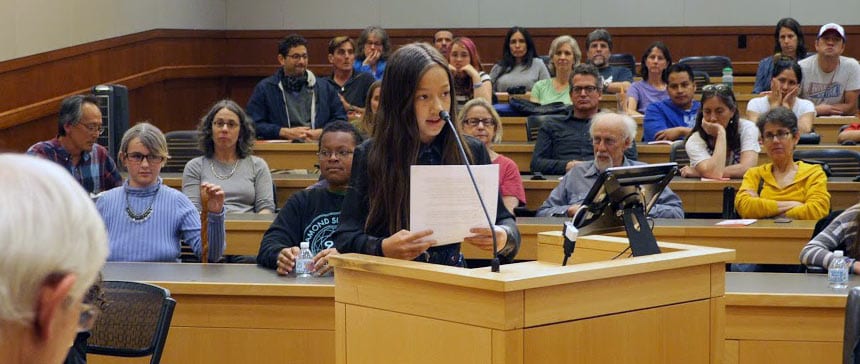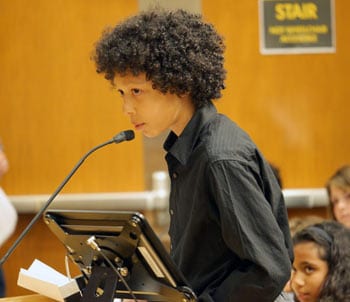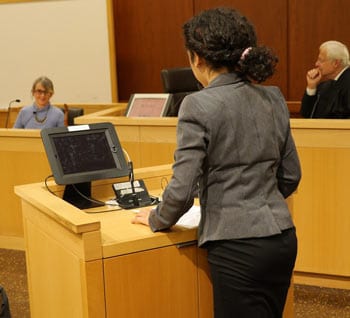
By Andrew Cohen
Jack Sinsheimer slowly increased the volume and urgency in his voice.
“This is a decision that could change a boy’s life forever,” the 10-year-old said, edging closer to the jury box inside Berkeley Law’s moot court room. “The prosecution must prove its case beyond a reasonable doubt. But what the prosecution has brought you are assumptions, claims and lies.”
Sinsheimer had the last word at Rosa Parks Elementary School’s annual Fifth Grade Mock Trial, and his closing argument helped sway the jury to find for the defense. He and 30 classmates took part in the spirited courtroom drama, held in two sessions on May 26 and June 2.
Clinical Professor Ty Alper, Berkeley Law’s associate dean for experiential education and a City of Berkeley School Board member, helped launch the program in 2013. “I was supervising James Stevens (’12) as a student in the Death Penalty Clinic and my daughter Rachel was in fifth grade at Rosa Parks,” he recalled. “I mentioned that it would be fun to teach a mock trial class at her school, and James said ‘Let’s do it.’ Neither of us had ever done anything like that before so we made it up as we went along.”
What started as a before-school enrichment program evolved into a meaningful connection between Berkeley Law and one of its neighboring public elementary schools.

“The program normalizes the concept of being a lawyer for kids who haven’t envisioned themselves in that role before,” Alper said. “They get to see themselves in a courtroom at UC Berkeley, in front of a real judge, arguing before a jury of 12 strangers. That’s empowering. And they develop skills, like public speaking and logical reasoning, that will hopefully serve them well as they head into middle school.”
Preparation meets performance
This year’s fictitious case was developed by Alper’s daughter Rachel and her friend, Tacy Prins Woodlief, both eighth graders at Longfellow Middle School in Berkeley. It focused on high school student Jack McCloud, charged with arson for setting fire to the locker of a classmate who had mistakenly accused him of cheating on a math test.
In the June 2 trial, student prosecutors Carolyn Booth, Martin Fierro, Kai Morrison, and Valerie Le framed the crime as one of revenge, as McCloud received a failing grade on the test and was sent to detention—before it was discovered that he did not actually cheat.
“Jack McCloud had the motive and the means,” Booth said during her powerful closing argument. “He told the principal he’d make sure ‘this never happened again.’ His classmate saw him buy a lighter but not cigarettes. He was there at the time the fire started. Jack was mad, and wanted revenge.”
Roya Carter, Micah Fong, Sayen Pena-Navarro, Sinsheimer and Casey Alper, Ty Alper’s son, formed the defense team. They argued that McCloud had a clean record and would not jeopardize his college future by committing such a rash act.
The students proceeded through all stages of an actual trial: opening statements, presentation of evidence, direct examination of witnesses, cross-examination, and closing arguments. The jurors at the June 2 trial consisted of 10 area elementary and middle school students, Berkeley Law graduate Emily Zia ’16, and Berkeley City Council member Darryl Moore.
Alameda County Superior Court Judge Jeffrey Brand ’69 presided over that trial and Demetrios Agretelis ’64, a retired judge on the same court, steered the previous session on May 26. “I couldn’t be more proud to do this,” Brand told the students after the jury’s verdict was read. “All of you were amazing, and I’m not just saying that. This was truly marvelous.”
Attention to detail
Brand noted how the students deftly avoided argumentative points in their opening statements, which are forbidden in trial practice. He also hailed the students for not asking leading questions during their direct examinations of student witnesses, which included McCloud’s classmates, math teacher, principal, and grandmother who dropped him off at school the morning of the fire.

The judge praised the witnesses for “not overacting and not overplaying it. You tried to be truthful—which is what a witness should do.”
Alper, Stevens, Joy Haviland ’08, Kate Weisburd, an attorney at the East Bay Community Law Center, and Alper’s daughter Rachel coached the students. Rosa Parks 5th grade teachers Mary Martin, David Barba and Diana Almanza Camarena and Principal Paco Furlan also provided behind-the-scenes support.
For 15 weeks, student participants practiced on Thursday morning before school, first learning the basics of public speaking and then developing more sophisticated trial practice skills. Alper thanked Rosa Parks Kids Village Assistant Director Roxann Reyes for recruiting “a great diverse group of students to participate in the program,” and for helping to run it for the past three years.
“When I was in fifth grade, I would have been terrified to stand up here and do what you did,” Brand told the students. “You amazed us tonight, and you inspired us.”